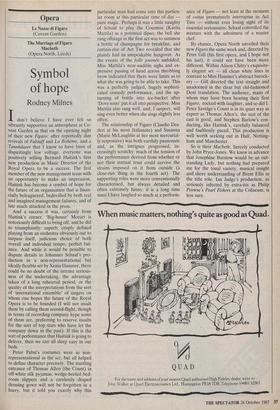Opera Le Nozze di Figaro (Covent Garden) The Marriage of
Figaro Macbeth (Opera North, Leeds)
Symbol of hope
Rodney Milnes
Idon't believe I have ever felt so vibrantly supportive an atmosphere at Co- vent Garden as that on the opening night of their new Figaro: after reportedly dim revivals of Falstaff and La Boheme, and a Tannhituser that I know to have been of dispiritingly low voltage, everyone was positively willing Bernard Haitink's first new production as Music Director of the Royal Opera to be a success. The first member of the new management team with an opportunity to make an impression, Haitink has become a symbol of hope for the future of an organisation that is finan- cially beleaguered, bedevilled by both real and imagined management failures, and of late much attacked in the press.
And a success it was, certainly from Haitink's corner. 'Big-house' Mozart is notoriously difficult to bring off, and he did so triumphantly: superb, crisply defined playing from an orchestra obviously out to surpass itself, judicious choice of both overall and individual tempo, perfect bal- ance. And while it would be possible to dispute details in Johannes Schaaf's pro- duction in a non-representational but ideally flexible set by Xenia Hausner, there could be no doubt of the intense serious- ness of the undertaking, the advantage taken of a long rehearsal period, or the quality of the interpretations from the sort of 'international ensemble' of singers on whom one hopes the future of the Royal Opera is to be founded (I will not insult them by calling them second-flight, though in terms of recording-company hype some of them are, preferring to reserve insults for the sort of top stars who have let the company down in the past). If this is the sort of performance that Haitink is going to deliver, then we can all sleep easy in our beds.
Peter Pabst's costumes were as non- representational as the set, but all helped to define character precisely. The startling entrance of Thomas Allen (the Count) in off-white silk pyjamas, wedge-heeled bed- room slippers and a carelessly draped dressing gown will not be forgotten in a hurry, but it told you exactly why this particular man had come into this particu- lar room at this particular time of day pure magic. Perhaps it was a little naughty of Schaaf to play the Countess (Karita Mattila) as a potential dipso; the bell she rang offstage in the first act was to summon a bottle of champagne for breakfast, and curtain-rise of Act Two revealed that she plainly had an unspeakable hangover. As the events of the folle journee unfolded, Miss Mattila's near-audible sighs and ex- pressive passing of hand across throbbing brow indicated that there were limits as to what she was going to be able to take. This was a perfectly judged, hugely sophisti- cated comedy performance, and the up- turning of bottle into ice-bucket after `Dove sono' put it all into perspective. Miss Mattila also sang well, and, I suspect, will sing even better when she sings slightly less often.
The relationship of Figaro (Claudio Des- deri at his most Italianate) and Susanna (Marie McLaughlin at her most mercurial- ly responsive) was both earthily passionate and, as the intrigues progressed, in- creasingly scratchy: much of the tension of the performance derived from whether or not their mutual trust could survive the strains imposed on it from outside (a close-run thing in the fourth act). The supporting roles were more conventionally characterised, but always detailed and often extremely funny: it is a long time since I have laughed so much at a perform- ance of Figaro — not least at the moment of coitus prematurely interruptus in Act Two — without ever losing sight of its essential seriousness. Schaaf controlled the mixture with the adroitness of a master chef.
By chance, Opera North unveiled their new Figaro the same week and, directed by Peter Gill (his first opera, and I hope not his last), it could not have been more different. Within Alison Chitty's exquisite- ly elegant set — all clean white lines in contrast to Miss Hausner's abstract barock- ery — Gill directed the text straight and unadorned in the clear but old-fashioned Dent translation. The audience, many of whom may have been hearing their first Figaro, rocked with laughter, and so did I. Peter Savidge's Count is in its quiet way as expert as Thomas Allen's, the rest of the cast is good, and Stephen Barlow's con- ducting, like Haitink's, carefully balanced and faultlessly paced. This production is well worth seeking out in Hull, Notting- ham and Manchester.
So is their Macbeth, fiercely conducted by John Pryce-Jones. We knew in advance that Josephine Barstow would be an out- standing Lady, but nothing had prepared me for the tonal variety, musical insight and sheer understanding of Brent Ellis in the title role. Ian Judge's production, as seriously infected by extra-itis as Philip Prowse's Pearl Fishers at the Coliseum. is less sure.


















































 Previous page
Previous page